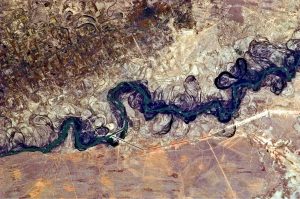Kazakhstan and Uzbekistan have agreed to install meters in each other’s territory to monitor water consumption and share data online with each other.
Kazakhstan’s Ministry of Water Resources and Irrigation announced the agreement on March 19, noting in a press release that Kazakhstan will install meters on Uzbek territory and Uzbekistan will install meters on Kazakh territory. The statement also said that talks are underway over where to install the meters and also with international organizations for assistance in the project.
Minister Nurzhan Nurzhigitov said, “The installation of meters will make it possible to monitor the volumes of water consumed by both countries online. Already in April, we plan to begin negotiations on the implementation of similar projects with our other neighbors.”
While water is often characterized as a potential spark for conflict in Central Asia, it is at the same time an opportunity for cooperation.
In late February, Tajikistan and Uzbekistan inaugurated two flow-monitoring stations on transboundary canals – the Great Fergana Canal and the Northern Fergana Canal – enabling real-time monitoring of water flows. The project was made possible by the Swiss government’s Blue Peace Central Asia Initiative, which it launched in 2017 to pursue a transboundary approach to managing Central Asia’s water resources. As Blue Peace notes, the majority of the region’s water resources are shared by two or more countries.
“In the absence of reliable water measurement systems,” Blue Peace noted in a project description, “it remains difficult to manage transboundary water resources and monitor compliance with water withdrawal limits.”
Take the Syr Darya: Originating in two headstreams – one in the Tian Shan Mountains in Kyrgyzstan and the other in eastern Uzbekistan – that meet in the Uzbek portion of the Fergana Valley, it flows more than 2,200 kilometers west through the northern Tajik city of Khujand and then across Uzbekistan and northwest into Kazakhstan where it empties, eventually, what little water is left into the North Aral Sea. Along the way, the river feeds the Toktogul reservoir in Kyrgyzstan, the Kayrakkum reservoir in Tajikistan, and the Shardara and Koksaray reservoirs in Kazakhstan – as well as feeding the Fergana Valley’s significant agricultural industry.
Given Kazakhstan’s downstream position, effective cooperation with upstream countries is necessary. Kazakhstan’s Ministry of Water Resources and Irrigation noted in its press release that “the agreement reached is important in the interests of our country, which geographically has less access to the sources of the rivers.”
In July 2023, Kazakh authorities announced their intention to amend agreements – adopted in 1998 – with Uzbekistan and Kyrgyzstan on the use of water and energy resources along the Syr Darya. Under these agreements, excess electricity generated by Kyrgyzstan’s hydropower plants in summertime is transferred to the other two, in exchange for energy resources (whether coal, gas, or other such supplies) in winter. As illustrated by Kyrgyzstan’s declaration of a three-year energy emergency on August 1, 2023, and worryingly low water levels at the Toktogul reservoir as spring approaches, there are valid concerns that the existing system cannot hold up in the face of climate change and growing consumption.
In its July 2023 announcement, Kazakhstan also complained about pollutants in the water flowing out of Uzbekistan, illustrating another difficult dynamic in the management of shared water resources.
At the time, Kazakhstan expressed hopes to sign an agreement with the government of Uzbekistan on joint management and use of transboundary water resources by December 2023. In late January 2024, Nurzhigitov, the Kazakh minister of water resources and irrigation, said that Astana still planned to sign such an agreement with Uzbekistan, as well as a separate agreement with China on transboundary rivers – but did not stipulate a timeline. The agreement on meter installation is nevertheless a signal of progress, as accurate and shared data about water flows will be critical in determining the more difficult matter of allocation.
In a November 2023 report, the Eurasian Development Bank noted that the countries of Central Asia “teeter on the brink of being categorized as ‘insufficiently supplied’ with water resources…” The report went on to conclude, “Water use issues require new mechanisms and tools for cooperation in transboundary river basins, primarily rooted in deeper economic integration among the region’s countries.”

































